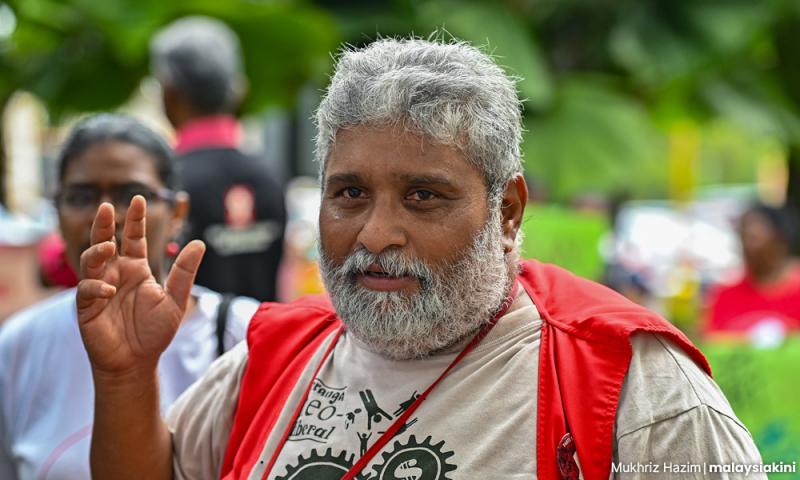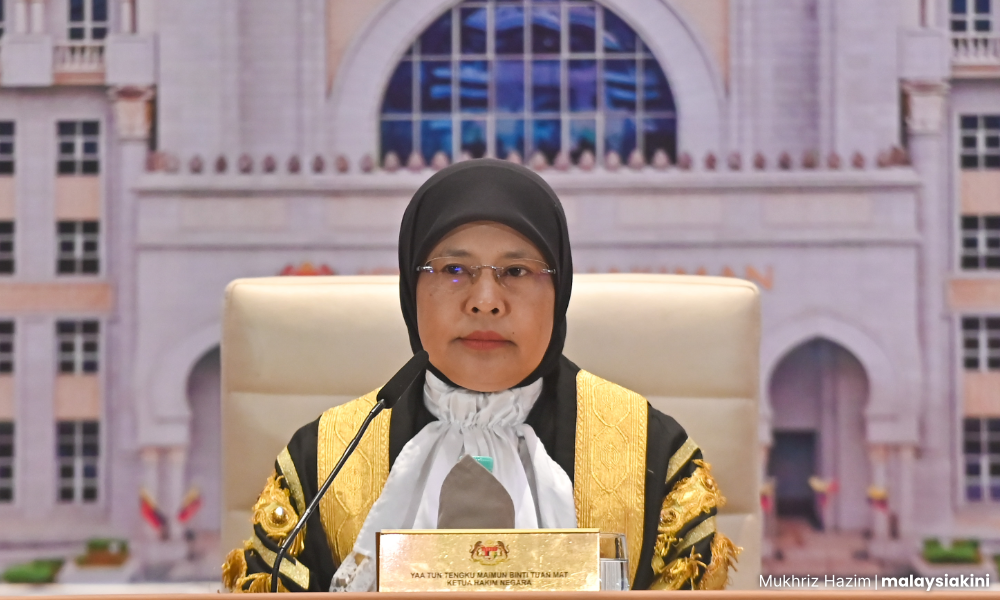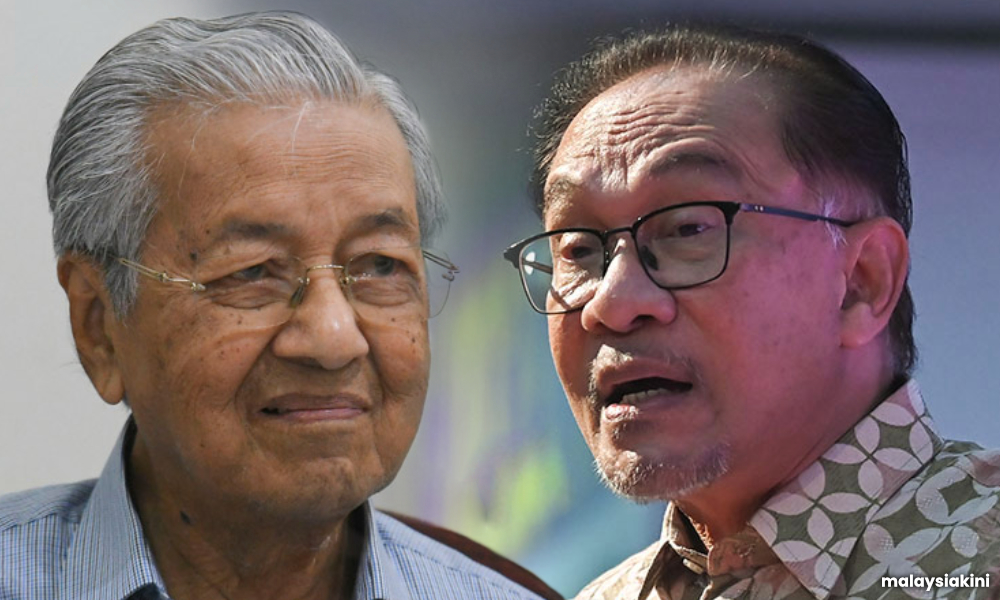


'Echoes of 1988': PSM slams Anwar, Harapan over CJ's tenure
Published: Jun 29, 2025 10:00 AM
Updated: 2:57 PM
Summary
- PSM deputy chairperson S Arutchelvan calls Chief Justice Tengku Maimun Tuan Mat “one of the finest” judges, and the government’s refusal to extend her tenure is a betrayal.
- He also questions the silence of the “so-called reformist coalition” Pakatan Harapan and compares it to the 1988 judicial crisis.
Prime Minister Anwar Ibrahim’s refusal to extend the tenure of Chief Justice Tengku Maimun Tuan Mat would be nothing short of a betrayal, emphasised PSM deputy chairperson S Arutchelvan.
He hailed the country’s first female chief justice as one of the finest, noting that she never succumbed to executive pressure and always spoke her mind without fear or favour.
“She could have taken an easier path, perhaps even secured an extension, yet she chose the principled stand most Malaysians would respect,” he added in a strongly worded statement.

Chief Justice Tengku Maimun Tuan Mat
Questioning if Malaysia is in the throes of another judicial crisis since the removal of Lord President Salleh Abas and five Supreme Court Judges in 1988, Arutchelvan criticised the silence of Pakatan Harapan on the matter.
“This silence of our so-called reformist coalition is so telling. What happened to the democratic conscience of DAP, Amanah, and PKR; these were the very parties that once championed judicial independence when in the opposition.
“Have they become so entrenched in power that they now hide behind the term ‘the prime minister’s prerogative’?” he asked.
‘Anwar learned from Dr M’
Arutchelvan said there have been numerous disappointments with Anwar since he became prime minister, and his actions are often justified as political survival.
“Yet his refusal to extend Tengku Maimun’s tenure would be a betrayal of the judiciary and the nation. Anwar’s popularity would have soared overnight had he retained her, as she remains a beacon of hope for institutional integrity.
“Instead, Anwar has mastered the art of clinging to power - a lesson likely learned from (former premier Dr) Mahathir (Mohamad).
“No one expected Mahathir to be a democrat or reformer, but we pinned our hopes on Anwar: the former student leader jailed under the ISA, assaulted in detention, and imprisoned on trumped-up charges by Mahathir and we believed Malaysia had progressed since the executive’s attack on judicial independence in 1988,” he added.
Questioning if Malaysia is in the throes of another judicial crisis since the removal of Lord President Salleh Abas and five Supreme Court Judges in 1988, Arutchelvan criticised the silence of Pakatan Harapan on the matter.
“This silence of our so-called reformist coalition is so telling. What happened to the democratic conscience of DAP, Amanah, and PKR; these were the very parties that once championed judicial independence when in the opposition.
“Have they become so entrenched in power that they now hide behind the term ‘the prime minister’s prerogative’?” he asked.
‘Anwar learned from Dr M’
Arutchelvan said there have been numerous disappointments with Anwar since he became prime minister, and his actions are often justified as political survival.
“Yet his refusal to extend Tengku Maimun’s tenure would be a betrayal of the judiciary and the nation. Anwar’s popularity would have soared overnight had he retained her, as she remains a beacon of hope for institutional integrity.
“Instead, Anwar has mastered the art of clinging to power - a lesson likely learned from (former premier Dr) Mahathir (Mohamad).
“No one expected Mahathir to be a democrat or reformer, but we pinned our hopes on Anwar: the former student leader jailed under the ISA, assaulted in detention, and imprisoned on trumped-up charges by Mahathir and we believed Malaysia had progressed since the executive’s attack on judicial independence in 1988,” he added.

Dr Mahathir Mohamad and Anwar Ibrahim
However, Aructhelvan argued that the same pattern is re-emerging under Anwar’s leadership.
“The civil society, former Bar presidents, legal experts, and countless others have united in calling for Tengku Maimun’s retention - a rare consensus in our fractured nation.
“With no separation of powers, a toe-the-line attorney-general, and an MACC chief commissioner focused on harassing the opposition, the judiciary has been our last bastion of hope. But come July, even that may erode,” he added.
Tengku Maimun is scheduled to go on mandatory retirement on July 1, at the age of 66. She was appointed as chief justice in 2019 under the Harapan government led by Mahathir.
However, Aructhelvan argued that the same pattern is re-emerging under Anwar’s leadership.
“The civil society, former Bar presidents, legal experts, and countless others have united in calling for Tengku Maimun’s retention - a rare consensus in our fractured nation.
“With no separation of powers, a toe-the-line attorney-general, and an MACC chief commissioner focused on harassing the opposition, the judiciary has been our last bastion of hope. But come July, even that may erode,” he added.
Tengku Maimun is scheduled to go on mandatory retirement on July 1, at the age of 66. She was appointed as chief justice in 2019 under the Harapan government led by Mahathir.
***
kt comments:
While I support the extension of Tengku Maimun's service, to compare the lack of any PM-indication as to an 'extension of service' for her as CJ, to the 1988 Constitutional Crisis is sheer bunkum. Arutchelvan has been tokking-kok. In 1988, serving judges were forcefully ousted by a draconian PM, whilst that is not so in Tengku Maimun's case
Dei Aru, don't kerbau okay?
No comments:
Post a Comment